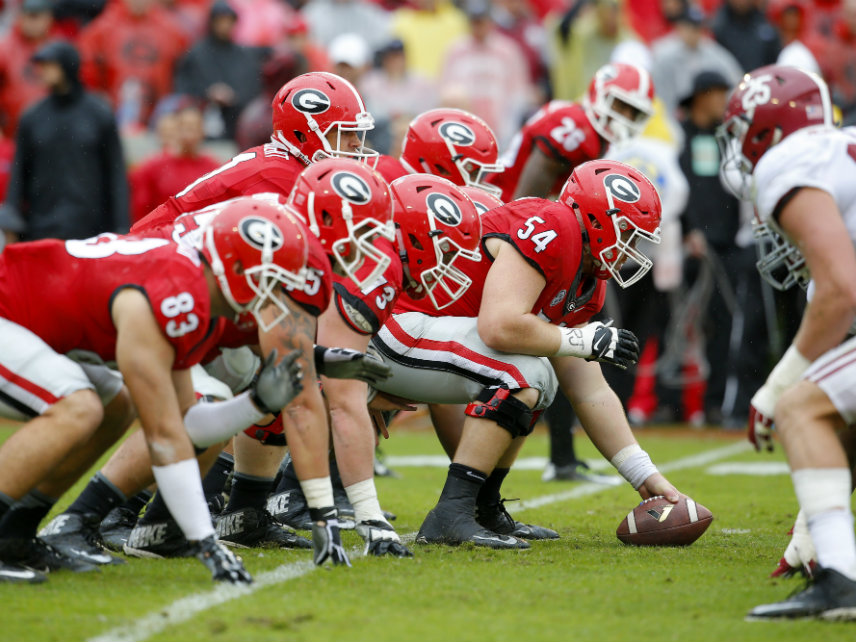Built for Tourists, the $98 Million Atlanta Streetcar Will Be Closed in Advance of Monday's College Football Championship
The worst streetcar in America earns its title once more.

"There's little doubt that the Atlanta Streetcar will be a good thing for the city's tourism business," Atlanta Magazine claimed in a 2015 article about the city's newest public transit offering.
The Atlanta Streetcar was an expensive and (for the city's residents, at least) useless endeavor in moving people from place to place. The $98 million system runs in a 2.7-mile loop downtown, connecting many of the city's top tourist sites, including the Coca-Cola Museum, Centennial Olympic Park, the neighborhood where Martin Luther King, Jr., grew up, and a brand new football stadium.
While the streetcar nearly reached planners' ridership expectations in its first year of operation, when it was free to ride, those numbers cratered last year, when a $1 fare was introduced. Perhaps that's because, as Atlanta Magazine found, riding the streetcar was no faster than walking. Perhaps it's because the streetcar doesn't really help commuters or residents of the city—the types of people who typically constitute the vast majority of a mass transit system's users.
Still, even as audits and independent assessments (including one by the Reason Foundation, which publishes this blog) showed the streetcar's failures, the streetcar had one useful purpose: helping tourists get around.
"Great for tourists," City Lab concluded in its own evaluation of the streetcar. "Not always the best option if you need to get somewhere without a car."
On Monday night, Atlanta will be flooded with tourists. The city is hosting this year's College Football Playoff national championship game, which pits two regional rivals—the University of Georgia Bulldogs and the University of Alabama Crimson Tide—against each other. Blocks around Mercedes-Benz Stadium have been transformed into "Championship Campus" in advance of the game. Police expect more than 100,000 people to attend the game and surrounding festivities.
Finally, a chance for the Atlanta Streetcar to shine, right?
Nope.
"The Atlanta Streetcar will run a modified schedule to accommodate preparation activities and the 2018 College Football Championship game," the city announced Friday.
"Modified schedule," in this instance, is a bit of euphemism. The streetcar was closed between 4 p.m. and 11 p.m. on Sunday, and it will be shut down from noon until 11 p.m. (the usual closing time for the line) on Monday—effectively making the streetcar nonexistent for anyone trying to get into or out of downtown Atlanta before, during, or after the big game.
Monday's shutdown is more evidence that the Atlanta Streetcar is the worst such project in the country. Besides being mostly useless, the system has been beset by management troubles, equipment failures, and safety problems—including inaccurate reporting of safety issues and accidents. In May, the Georgia Department of Transportation threatened to shut down the streetcar unless the city's transit authority got things under control.
And even if the streetcar somehow got back to the ridership level (809,000 passengers) that it had when it was free, a $1-per-ride fare wouldn't come close to balancing out the line's $5 million annual operating cost. The city claims the streetcar has generated $1.5 billion in economic activity, but an investigation by the Atlanta Journal-Constitution found that many of those claimed benefits come from building projects that were already happening before the streetcar was approved.
The city apparently is continuing the misinformation campaign. The most hilarious part of the city's press release announcing the cancellation of streetcar service on Monday is the boilerplate paragraph at the bottom, which includes the claim that "the Atlanta Streetcar is the best way to get around Downtown Atlanta."
That's doubtful on the best of days. It's certainly not true on Monday, when the streetcar won't help a single person get to the college football championship.


Show Comments (37)